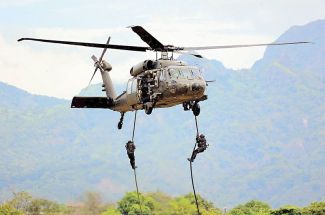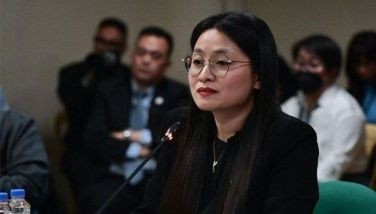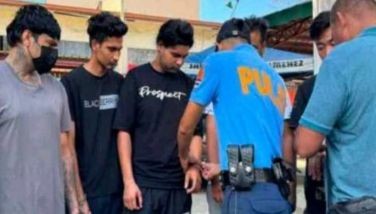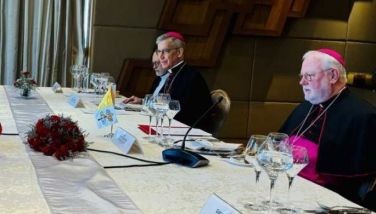Bato tussles with Europe parliamentarians on ICC
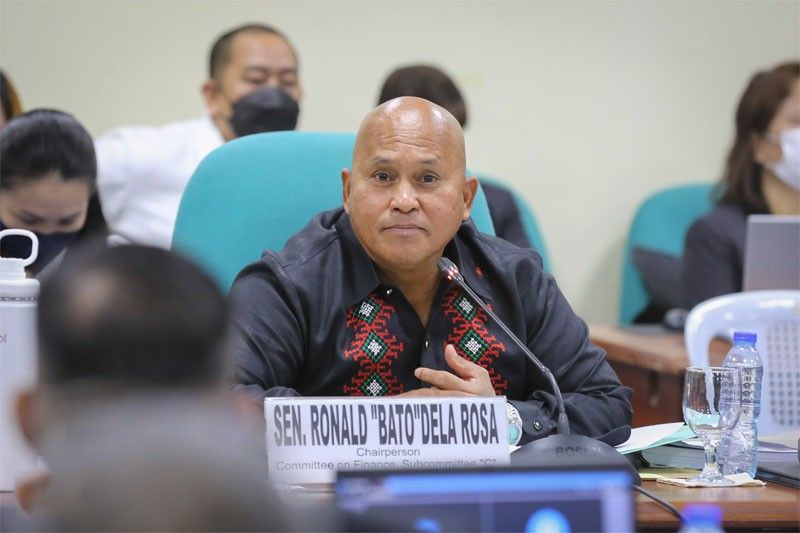
MANILA, Philippines — Visiting lawmakers from the European Union got some pushback from senators on the move of the International Criminal Court (ICC) to investigate the Duterte administration’s war on drugs, as Sen. Ronald “Bato” dela Rosa drew from historical wounds inflicted on the Philippines to deny foreign interference in the country’s domestic affairs.
Dela Rosa, along with Sen. Francis Tolentino, vice chairman of the Senate foreign relations committee, and Senate Deputy Majority Leader Joseph Victor Ejercito, met with five EU Parliament members – Hannah Neumann, Isabel Wiseler-Lima, Ryszard Czarnecki, Karsten Lucke and Miguel Urban Crespo.
The visiting legislators, all members of the subcommittee on human rights, were joined by EU Ambassador Luc Veron and two officials from the Department of Foreign Affairs.
During the meeting, Dela Rosa said he berated the Spaniard, Crespo, who he described as “very hot” on the issue and even questioned why Sen. Jinggoy Estrada filed a resolution opposing the ICC investigation.
“So I answered him: ‘You know, your honor, if you know your history, we were conquered, ruled and enslaved by the Spaniards for more than 300 years and now we gained our freedom, we expect other countries will respect our sovereignty’,” Dela Rosa said in Filipino.
“Who is he (Crespo) to question that move by Sen. Jinggoy? I am not asking for apology, I just vented, ‘you’ve been here in the Philippines for 300 years exploiting our country, now you are going to lecture us about human rights,” he said.
He said he did not wait for Crespo’s reply since he had to preside over a committee hearing on Marawi compensation.
Tolentino, however, said there was no shouting match as Crespo was speaking through an interpreter that appeared to have been loud.
Despite the momentary tussle, Tolentino described their meeting with the EU parliamentarians as fruitful and constructive as it also covered discussions on incidents in the West Philippine Sea and the Philippines’ application for the expansion of its privileges under Generalized Scheme of Preferences Plus (GSP+), which grants developing countries special trade incentives to pursue sustainable development and good governance.
“We explained to them our position regarding the ICC, that we are asking them to respect our processes and the leadership as a sovereign state, and we’re not part of the ICC and they respect that…They should respect us in the same manner as we respect them. That’s the principle of reciprocity,” Tolentino told reporters partly in Filipino after the meeting.
He said he also reminded them that the Philippines was one of the original signatories to the United Nations Universal Declaration on Human Rights 1946.
He said he questioned the parliamentarians on the human rights violations committed against Filipino workers in the EU, particularly victims of human trafficking and reports of Filipino truck drivers being hired through third parties and other reported abuses in other countries.
Tolentino also enumerated some efforts of government to uphold human rights, including increasing protection for women, senior citizens, students, “such as the right to free education to free access to health care — that’s human rights — and they saw our progress.”
Neumann noted the relations between the EU and the Philippines have always been “a very close one,” especially with Filipino workers doing “crucial and instrumental” work in key sectors in the union.
She, however, said the European Parliament sees the country’s prosecution of extrajudicial killings in relation to the campaign against illegal drugs as slow.
“I think the position, especially of the European Parliament, has been quite clear: that we were deeply concerned about the extrajudicial killings… We see happening right now prosecutions starting but being rather slow, with at least 6,000 people killed in the war on drugs. Only 20 cases filed and three people were victims,” Neumann said.
“We, as the European Union, are members of the Rome Statute, we support the ICC and we see this as a potential to support the investigation to the killings. We clearly understand that at least the senators we’ve met right now see this differently. Well, I mean, this is exactly part of the discussion we’re having… but they are constructive and fruitful, that’s how I would describe it,” she said.
Drug cartels, human trafficking
For Justice Secretary Jesus Crispin Remulla, the ICC should investigate drug cartels responsible not only for trafficking drugs but also people instead of the drug war waged by former president Rodrigo Duterte.
Remulla said he had met with President Marcos to discuss the pending appeal to stop the ICC’s prosecutors from investigating the Philippines and that the administration intends to continue the investigations on its own.
One of the biggest concerns as to why ICC prosecutors are dead-set on investigating the drug war killings during the Duterte administration and his time as mayor of Davao City is the Philippines’ inability to match the ICC’s capabilities as reflected on the Office of the Solicitor General’s submissions.
The ICC findings last year that led to the decision to resume the investigation appeared to have offended the DOJ, which is the agency leading the task force to investigate extrajudicial killings.
“We have only been here for eight months and we want to continue the investigations and I hope this is not just a trap to politicize us because if the ICC really wants to investigate, why don’t they investigate the drug cartels that are destroying our country? That’s why we have a drug war,” Remulla said.
“Until now we have a silent drug war because these cartels are still destroying our lives. Why don’t they investigate that?” he added.
A flurry of legal remedies from the OSG to stop the ICC investigation still led the ICC to clear the way for prosecutors to commence their probe.
Meanwhile, the United Nations Subcommittee on Prevention of Torture (SPT) concluded its latest session with confirmation to visit the Philippines, Georgia, Guatemala and the State of Palestine during the second half of 2023.
“During the session, the SPT also finalized plans to visit South Africa, Kazakhstan and Madagascar, Croatia, Georgia, Guatemala, the State of Palestine and the Philippines in 2023,” the UN SPT said in a statement.
In each country visit, besides examining places of deprivation of liberty, the SPT meets with public authorities responsible for the prevention of torture and ill-treatment and assists the country’s independent torture prevention watchdog, formally named the National Prevention Mechanism (NPM), where applicable.
The SPT monitors state-parties’ adherence to the Optional Protocol to the Convention against Torture, which has been ratified by 91 countries.
The Philippines is a state party to the Optional Protocol to the Convention against Torture and other Cruel, Inhuman and Degrading Treatment or Punishment (OPCAT) whose compliance with obligations set out in Article 17 of the OPCAT is “substantially overdue.”
The SPT has a mandate to visit states that have ratified the OPCAT during the course of which it may visit any place where persons may be deprived of their liberty and assist those states in preventing torture and ill-treatment. The subcommittee communicates its observations and recommendations to states through confidential reports, which it encourages countries to make public.
The SPT has also decided to launch a public consultation on its first general comment, a legal guide, on the definition of places of deprivation of liberty. The SPT will publish its first draft in three working languages to seek the views of all stakeholders in preparation for the public discussion at its June meeting.
“This is an important development, and we call on all interested parties to provide input to enrich the draft,” said Suzanne Jabbour, newly reelected chairperson of the SPT. – Neil Jayson Servallos, Pia Lee-Brago
- Latest
- Trending

















